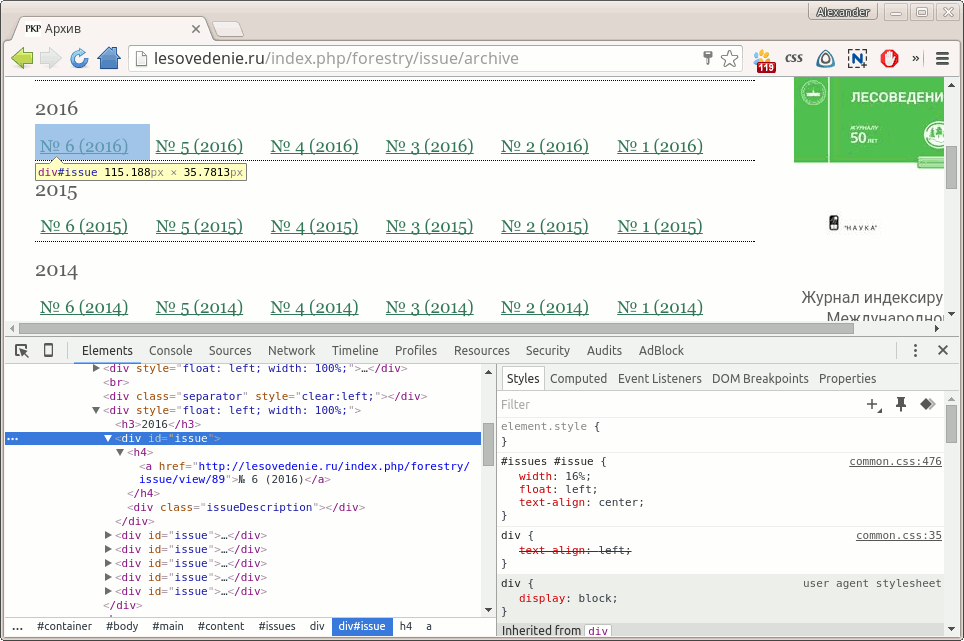That was a fork of 2.4.8. I do not think it is stable enough.
Could you please let me know how did you set up the archives page? Like putting the issues in horizontal list instead of vertical. Kindly do let me know. Thanks
And what about using author names in Latin alphabet only? As editor of Ukrainian journal I don’t see problems here.
Vitaly, thanks, but once again. Many scientific journals in the Russian Federation are included in the official List of the Higher Attestation Commission of the Russian Academy of Sciences and they MUST for Russian authors to show Russian names (on Russian version of site).
On the other hand, many of these same journals are tracked by SCOPUS and they MUST for Russian authors to show transliterated names (on English version of site).
Our journal is included in the List of the Higher Attestation Commission of the Russian Academy of Sciences and we are tracked, but have not yet included in the SCOPUS.
Unfortunately we cann’t use author’s names in Latin alphabet only. ((
Yes, I saw in the discussion on this forum a link to this github repository with OJS 2.4.8 with bilingual author’s names but when I try to use it on my local server it crashes (strange PHP errors).
Did you say about http://lesovedenie.ru/index.php/forestry/issue/archive? There’s a CSS rule, nothing more 

How did you make the bilingual authors’ names? Do you use OJS 2.4.8?
OJS does not support bilingual names, so I hacked it 
I made it three times: with OJS 2.4.2, 2.4.7.1 and 2.4.8.1 but I never even try to port these changes to 3.* because of differences between 3rd and 2nd branches.
Thx shoorick for the answer! I understand correctly that OJS uses a Symfony framework (Symfony 2 for OJS 2.x branches, and Symfony 3 for OJS 3.x branch)?
No, unfortunately, OJS uses a home-built framework, both in version 2.x and version 3.x. We are getting better about leveraging existing frameworks rather than rolling our own, but we’re still using a custom MVC, augmented by some common components (like Smarty).
It is not hard to customize OJS code. It uses standard OOP style. I am not a programmer and already have success in customizing OJS3 back-end and front-end. Maybe you know programming and need some guidance?
Thanks Vitaly but for me OJS is still like Chinese now. I studied for a programmer (ASM, Pascal, C, LISP) in our university, but for 20 years I have been involved in printing design (Adobe products etc. and including LaTeX) so now I’m just starting to understand the web technologies. Naturally, I know OOP paradigm and I understand a little what is meant by the Model-View-Controller paradigm, but I’m programming neither PHP or JavaScript. I only know HTML and CSS, and a little bit of SQL. While I set myself the task of independently implementing bilingual names of authors and references in OJS 3 (probably this issue will not be realized in the foreseeable future by PKP) and now I’m trying to get into the PHP myself.
That’s far more than I knew in programming when started working with journal on OJS a year ago. Try to download OJS on local computer and experiment with the code on the IDE.
I have started to learn OOP paradigm in Java and then moved to PHP. There are much more good books for the first language, then latter. And in ny opinion OJS inhereted more from JavaEE then from standard PHP.
Also the code what you want is not require much coding.
Besides, I am too interested in this. So if you will start, I can help. I already have done few modifications in the code. But not to do all the work for you. I must finish my PhD soon 
Thanks Vitaly! If you don’t mind, I will send a message to you with questions when I come close to the internal structure of OJS. I wish you a successful PhD degree!
Is there any progress in solving this issue?
Nowhere near, in my opinion… I tried OJS 3.1 on a virtual machine and found no multilingualism of the author’s name as well as journal’s contacts. A huge disappointment from the release 
Here is the relevant issue: